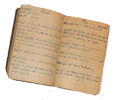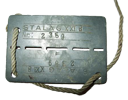January 1942 Lebanau
January 1st 1942. Another year and I was still here. I was beginning to wonder if it would ever end. It was bitterly cold and the snow was very deep. I was still working in the woods. Several of the men had frost bitten hands. We had had no Red Cross parcels and our others had been used up. The gaffer on the farm had cut our rations and tempers were getting short again. I had a fight with Jock; during one dinner he started grabbing all the best pieces instead of sharing it out, as we always did. Nobody was saying anything but the atmosphere was very strained. He was the biggest chap in the camp but I tackled him about it and swore at him calling him a Scots !*****! and he just waded into me. At any other time I would never have thought to have a go at him, he was nearly twice as big as me. I got the worst of it and was very sore for a while but he didn’t grab the biggest share after that, so I suppose it did some good. The funny thing was, I got on very well with him before and after the event. He was a decent chap really but when you are hungry, it plays havoc with your emotions.
On the 20th of February we were clearing snow from the roads, shovelling it away on to the sides, leaving a gap that was wide enough for the sleighs to get through. From the road level the snow level was higher than we were and we couldn’t see over the top. The snow wasn’t like at home and we needed to cut it into blocks to throw it aside.
On the 27th some Red Cross parcels arrived again. As a result things improved. It was surprising what a difference they made to everybody’s morale and general spirits.
On Sunday the 19th of March everyone received a new tunic from the Stalag. I also got a new pair of slacks so I now had a spare pair. It was also Hitler’s birthday. The snow was still coming down and we were still clearing the roads in between the other jobs on the farm. The job seemed never ending.
Thursday 23rd of April. Twenty six Poles had arrived on the farm so now there were twenty six men to do the work that ten of us had been doing previously. We left Lebanau by horse and cart, travelled for about twenty five miles, and arrived at Finckenstein [now called Kamieniec Suski] late in the evening.
While we had been at Lebanau the billet had been quite comfortable and, except for two really bad periods, we had better food. Vic did a good job as cook; when we were getting short, on several occasions, he managed to get a bit more from the gaffer or scrounge some from somewhere. It wasn’t an easy time though; it was no fun being hounded by the civilians and guards alike and being deprived of your liberty.
The work was hell and I have never worked so hard in my life. It wouldn’t have been so bad if we could have worked at our own pace but we were always being chased, sometimes with blows from the German civilians. There was a big strong Scot by the name of Cassie who stood up to one and was going to belt him but the guard pushed him back with his bayonet. Two civilians then beat him up. The guard didn’t report it but if he had, Cas could have been in real trouble for threatening to strike a German. Even so, we very often came very close to having a go at them. It seemed so much worse that civilians should treat us like that. However, by making the best out of a bad job and trying to keep our sense of humour, we managed to carry on. We always tried to keep laughing and joking which made the Germans madder than ever.
There were always some lighter moments of course, there always are. I enjoyed two days when we went to Muttersegen (another farm where we helped out sometimes) when they wanted someone to drive the wagon there and back. I volunteered because it looked easy. There were two horses pulling the cart that were harnessed side by side. The driver rode on one and had a saddle like the ones used by American cowboys. I had never ridden a horse in my life but I got on alright and had lots of encouraging shouts and advice from the lads. It was a good job that we were walking all the way and the horses seemed to know where we were going. I ended up being a bit sore in an entirely new place!
As well as horses, oxen were used to pull the wagons and for ploughing. They were obstinate brutes and when they didn’t want to move any faster it was a hell of a job to make them. When they were on their way home at night, though, it was a different story; there was no stopping them and they would go hell for leather, seeming to know they were going home. I didn’t have anything to do with them but Jock and Cas worked with them a lot.
We did some sheep shearing – at least we caught them and helped to hold them. We also looked after the pigs and loaded them on to the wagons to go to market. That was a laugh, and we would sometimes accidentally let the piglets escape, which resulted in men and piglets running around the farmyard.
On the whole we were better off in many ways but if we had not had the Red Cross parcels, most of the time, we would have been in a very sorry state. I know that we couldn’t have done the work on the rations that were issued to us because we would have been too weak. As it was we were still thin and much weaker than we should have been. One thing we were very pleased about was that we had got rid of all the lice. With regular washing and clean clothes they just disappeared, and they never came back while we were on the farms. One thing that we were pestered with on the farm though was flies. There were thousands of them and it was a regular thing, while we were eating our stew, to have to keep scooping them out of it after they had committed suicide by diving into it. We were issued with fly papers but they soon became covered and were useless.
I had to have another tooth out one day and was taken to Riesenburg. The dentist was a Polish woman who said she was doing it in the absence of her husband. It was worse than the other one I had had out. There wasn’t enough cocaine and she broke the tooth getting it out. A lot of my teeth seemed to be going bad – I think it must it must have been too much stew.
The German civilians were a very bad bunch, without a good one amongst them. Although it was our policy to work as slowly as we dared, and to cause as many problems as we could, it wasn’t always possible with them and they treated us very rough. I would still sooner have been on a working party like this, than be in a Stalag. On the farm you didn’t get a lot of time to think and brood, whilst in the Stalags many more seemed to go to pieces.
The highlight of the time on the farm (or any other place, come to that) was when the mail arrived. One man called out the names of the lucky ones and you waited and hoped very hard that there would be one for you. If there was, you would just climb on to your bunk to read it over and over again. It was good to hear from home and know that everyone was alright.

